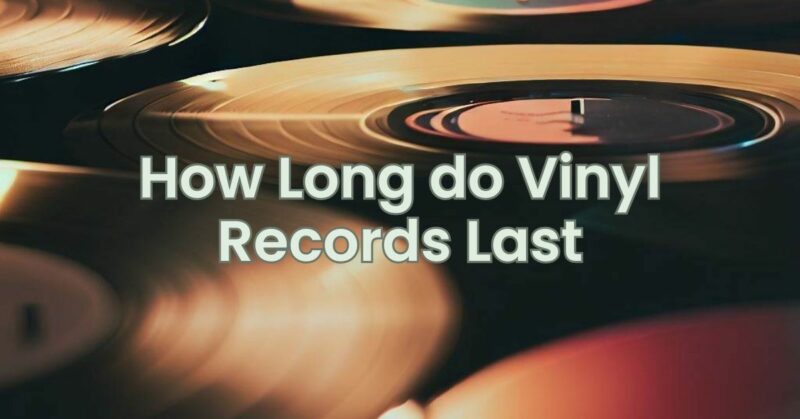Vinyl records have long been cherished for their warm sound, tactile experience, and timeless appeal. As collectors and enthusiasts, it’s natural to wonder about the lifespan of these beloved musical artifacts. How long can vinyl records be enjoyed before they degrade or become unplayable? In this article, we will delve into the factors that affect the longevity of vinyl records and explore ways to maximize their lifespan.
- Vinyl Material and Quality: Vinyl records are typically made from polyvinyl chloride (PVC), a durable and resilient material. When properly manufactured, vinyl records can last for decades. However, the quality of the vinyl itself can vary, with some records being more prone to degradation than others. Higher-quality vinyl records, especially those pressed with virgin vinyl, tend to have a longer lifespan compared to lower-quality or recycled vinyl.
- Handling and Storage: How records are handled and stored significantly impacts their longevity. Proper handling involves holding records by the edges to prevent fingerprints and smudges on the playing surface. Avoid placing records on surfaces without protective sleeves, as this can lead to scratches or damage. Storing records in an upright position, away from heat, humidity, and direct sunlight, is essential. Excessive heat or moisture can warp records, while sunlight can cause discoloration and deterioration of album covers.
- Cleaning and Maintenance: Regular cleaning is crucial for maintaining the quality and longevity of vinyl records. Dust, dirt, and debris can accumulate on the surface, affecting sound quality and causing unnecessary wear on the stylus. Use a carbon fiber brush or a record cleaning brush to remove surface dust before each play. Additionally, periodic wet cleaning with a gentle record cleaning solution can help remove deeper dirt and grime, preserving the record’s fidelity and longevity.
- Playing and Stylus Care: Proper turntable setup and alignment, along with correct tracking force, are essential for minimizing wear on vinyl records. A well-adjusted turntable and stylus exert the right amount of pressure on the record’s grooves, ensuring accurate playback without excessive wear. Regularly inspect and clean the stylus to prevent buildup of debris that can damage both the stylus and the record.
- Usage and Environmental Factors: The frequency of play and environmental conditions also affect the lifespan of vinyl records. Excessive play can result in groove wear and increased susceptibility to damage. Additionally, extreme temperatures, high humidity, and rapid fluctuations in environmental conditions can lead to warping, cracking, or mold growth. Maintaining a stable and moderate environment for your records can help prolong their lifespan.
- Vinyl Record Care Myths: There are various myths surrounding vinyl record care that should be debunked. For example, some believe that freezing or baking records can fix warps or remove scratches. However, these methods can further damage the records and should be avoided. Similarly, the use of household cleaners or solvents for record cleaning can cause irreversible damage. Stick to gentle record cleaning solutions specifically designed for vinyl records.
With proper care, handling, and storage, vinyl records can last for several decades, providing countless hours of enjoyment. While there is no definitive expiration date for vinyl records, their lifespan depends on various factors, including vinyl quality, handling practices, storage conditions, cleaning, and usage. By following the recommended guidelines and adopting good record care habits, you can maximize the longevity of your vinyl collection and ensure that these musical treasures continue to bring joy and nostalgia for years to come.

